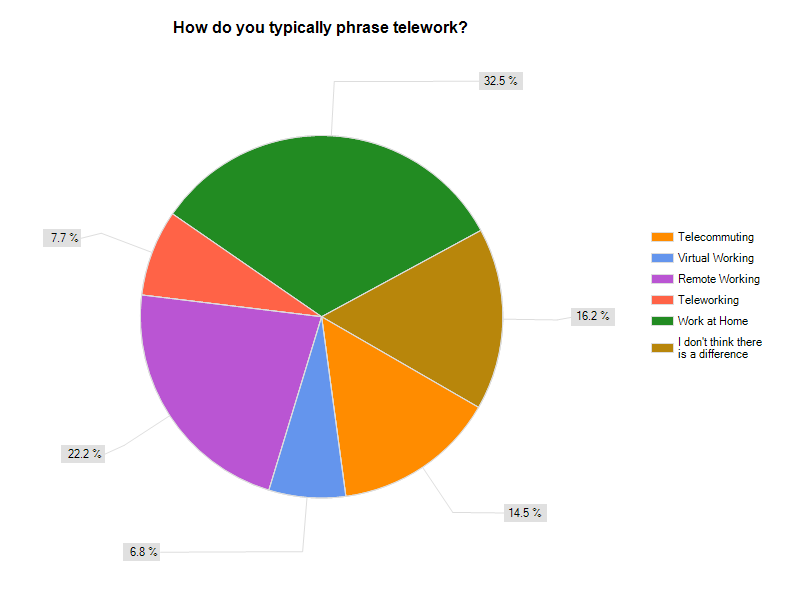Telework or No?
Productivity vs. Collaboration
What is Telework?
Working partially or entirely at home or at a specifically assigned center instead of working at a company office.
Telework is a more general term that encompasses the use of telecommunications and information technology for work purposes, typically away from a company office, and includes at-home workers who may never have a commute.

Telework in the world
• Europe:
● 1.2 to 4.6 million
• Japan
● ~1 million
-
United States
-
● 1990: 4 million
-
● 1997: 11.1 million
-
● 2003: 19.6 million (20% of workforce)
-
-
Reliable estimates are unavailable
Telework & Government
• The United States Congress and governmental agencies have been increasingly promoting and encouraging telework.
• Currently:
~4.2% of 75,000 Federal employees in 63 agencies are teleworking.
Telework vs. Non-telework
Non-telework impacts:
EINTW= EITR+ EIWREE+EIWRHS+EIWOS
Telework impacts:
EITW= EIT + EIEE + EIHS +EIOS
* TR/T=transportation, WREE/EE=electronic and electrical equipment, WRHS/HS=house space, WOS/OS=office space
Benefits of Telework
- Faster Growth
- Resource Allocation
- Efficient Communication
- Enhanced Work Hours
- Energy Saving
- Potentially Reduce traffic and associated polution
While telework is very common in the tech hub, Sillicon Valley, it is surprising that Marisa Mayer, CEO of Yahoo! announced the ban of telework in 2003
*the ‘modern stone age family’

“To become the absolute best place to work, communication and collaboration will be important, so we need to be working side-by-side. That is why it is critical that we are all present in our offices. Some of the best decisions and insights come from hallway and cafeteria discussions, meeting new people, and impromptu team meetings. Speed and quality are often sacrificed when we work from home.”
Uproar against the policy from industry observers:
"earns you good work attendance marks but are not effective and efficient at meeting company goals"
"United States already trails other industrialized nations when it comes to providing flexible work arrangements"
"In an age when remote working is easier and more effective than ever. This policy is a step backwards"
"In an age when remote working is easier and more effective than ever. This policy is a step backwards"
" This changed policy could further lower employee morale and hurt recruiting efforts"
................
Supporters:
"We believe strongly in employees working physically close to one another to encourage collaboration"
One week after the announcement, Best Buy informed its headquarters employees that its flexible work program was canceled and that it expected employees to work a traditional 40-hour week at its headquarters.
Post-policy:
In the report, Yahoo’s Ford-Tempesta points to the near-doubling of the stock price since the beginning of the year, an assertion which is dubious at best considering how much of that value is tied up in the company’s 24% stake in the soon-to-IPO Alibaba, while its third quarter revenues and profits are both down compared to a year ago.
It is reported that the policy bringing its agile programming teams together in the same place at the same time can have a small but crucial impact on performance. In his book People Analytics, MIT visiting scientist Ben Waber discusses the role of dependencies for programmers, that teams must coordinate closely to ensure their code meshes well. Citing others’ research as well as his own, Waber argues remote programmers are 8% less likely than co-located groups to communicate about dependencies, which translates to 32% longer code completion times—or death when you’re already as lumbering as Yahoo. "For Yahoo, then, this means their workforce becomes about 3% more effective with the stroke of a pen," Waber wrote, the value of which he pegs at $150 million.
That may not be quite as much as the $17 billion in market cap that the report lays at the feet of killing working from home, but Mayer certainly doesn’t have to say she’s sorry, either.
Even when flexibility isn’t awarded as a ‘perk’, it can still function to attract top talent. That’s because flexible policies signal that a company is willing to innovate, evolve, and adapt to a changing marketplace. Talented recruits don’t want to land at a company stuck in the 20th century.
Is telework considered a perk?
Imagine that you are a member of a firm’s human resources group trying to decide whether or not to support telework. What factors would you consider in making this decision? What process would you follow to arrive at a decision that could be accepted by employees and senior management as well?
My Six Cents:
Depends on the company type, work culture, ownership of the work tasks and the people, if telework is an existing form of the company and it's been working well and everyone is happy with it, there is no point to stop it. On the other hand, if employees in general has low work morales, or communication has become an issue while working remotely, it's a better idea to work together.
Questions, Doubts, Comments?